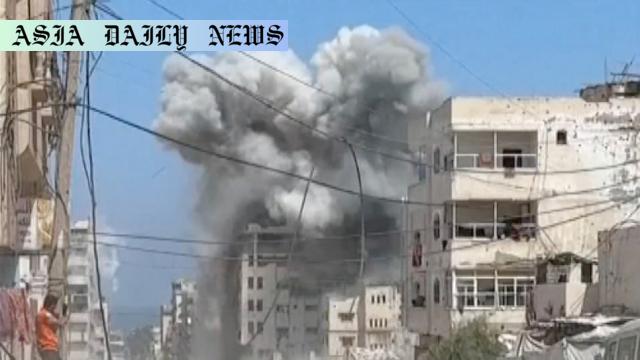Ceasefire: 28 countries, including Japan and the EU, demand an immediate truce in Gaza, urging for the lifting of aid restrictions.
- 28 nations, including Japan and the EU, have called for a ceasefire in Gaza.
- The joint statement emphasizes lifting aid restrictions and enabling safe NGO operations.
- Hamas welcomed the appeal, while Israel rejected the statements, citing Hamas’s role in the conflict.
- Ongoing conflict escalates civilian casualties, highlighting the urgent need for humanitarian aid.

Introduction: Global Appeal for a Ceasefire in Gaza
The ongoing conflict in Gaza has prompted 28 countries, including Japan and members of the European Union, to issue an urgent joint statement demanding an immediate ceasefire. The joint appeal emphasizes the necessity of lifting restrictions on aid flows to ensure that the United Nations (UN) and humanitarian non-governmental organizations (NGOs) can operate safely and effectively in the crisis-stricken zone. As civilian casualties continue to escalate, the call stresses the need for the international community to unite in bringing the conflict to an end, asserting that further bloodshed serves no constructive purpose.
Humanitarian Impact: A Region in Crisis
The Gaza Strip has been facing severe humanitarian challenges since the outbreak of hostilities in October 2023. Reports highlight Israeli military operations extending into Deir al-Balah in central Gaza, a strategic location rarely accessed by Israeli forces in recent conflict history. The situation has triggered widespread suffering, with local health authorities reporting over 1,000 fatalities to date due to the violence. Food shortages further compound the crisis, despite relief efforts, such as a US-led foundation’s food distribution campaign earlier this year.
Conflicting Responses: Hamas and Israel
In response to the joint statement, Hamas has expressed approval, encouraging global efforts for a resolution. However, Israel has strongly rejected the call, emphasizing that Hamas is the entity responsible for initiating and perpetuating the violence. The Israeli Foreign Ministry urged critics to direct their concerns toward Hamas, rather than focusing solely on the actions of Israeli forces. These conflicting stances highlight the deeply entrenched divisions fueling the ongoing crisis.
The Role of Aid and Humanitarian Efforts
International humanitarian organizations face significant challenges in providing assistance to the affected population in Gaza. Reports of violence near food distribution sites and the continued obstruction of aid have undermined efforts to support civilians. The call for lifting restrictions on aid aims to provide a more secure environment for these organizations, enabling them to deliver life-saving resources and services without fear of violence. However, achieving this requires a concerted effort by all stakeholders to de-escalate tensions and ensure cooperation on humanitarian grounds.
A Unified Global Responsibility
The joint appeal by 28 nations underscores the urgent need for collective action in addressing the Gaza conflict. It seeks to unite the international community in reducing human suffering, promoting peace, and preventing further bloodshed. While the road to resolution remains fraught with challenges, these global efforts represent a critical step toward highlighting the importance of diplomacy, collaboration, and humanitarianism in the face of conflict.



Commentary
Global Solidarity: A Step Toward Peace
The joint statement by 28 nations and the European Union calling for a ceasefire in Gaza marks a significant moment of global solidarity. It emphasizes the international community’s shared responsibility to protect innocent lives and foster peace. In a world where conflict too often seems inevitable, such unified voices offer a beacon of hope. By urging the immediate lifting of restrictions on aid and ensuring the safety of humanitarian workers, the statement reflects a compassionate and proactive approach to addressing the worsening crisis in Gaza.
Challenges Amid Calls for Resolution
However, the path toward resolution remains fraught with complexities. Israel’s rejection of the appeal underscores the deep-rooted divisions and differing narratives surrounding the conflict. By placing blame on Hamas, Israel’s stance highlights the challenges in achieving a consensus on accountability and next steps. This tension also has implications for international diplomatic efforts, which must navigate these divergent perspectives to foster an environment conducive to peace. Resolving such disputes requires a balanced, patient approach rooted in mutual understanding and compromise.
The Crucial Role of Humanitarian Aid
The emphasis on aid within the joint statement resonated deeply with the unfolding humanitarian crisis. The people of Gaza are in dire need of assistance, from basic necessities to medical care. Yet, reports of violence near aid sites reveal the precarious conditions under which relief work is conducted. Providing unhindered access to humanitarian organizations is not only a moral imperative but also a practical step in restoring stability and trust within the region. Failure to address these immediate needs will only perpetuate the cycle of suffering and strife.
A Call for Unity and Action
Ultimately, the appeal for a ceasefire reflects the urgent need for unity among nations and within the international community. While differences between parties remain, the shared objective of ending violence and preventing further casualties must take precedence. The statement’s call to unite in a common effort offers a powerful reminder that peace is possible when humanity chooses collaboration over conflict. As the world watches events unfold in Gaza, it is a poignant moment to reflect on the universal values of compassion, cooperation, and the unyielding pursuit of peace.